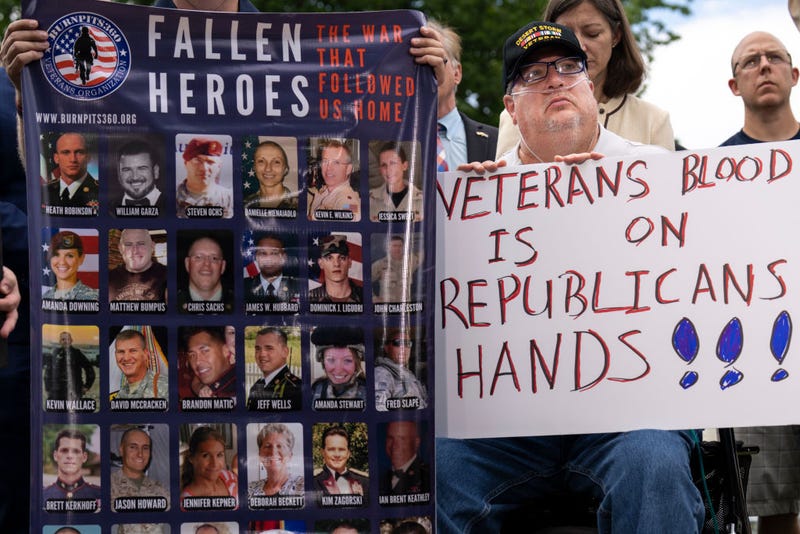
A bill that would have expanded healthcare coverage for military veterans who were exposed to toxins and burn pits during their service has been blocked in the U.S. Senate after previously being passed.
The bill was reintroduced to the Senate floor with an error corrected in it, but after passing with 84 votes two months ago, it failed Wednesday with only 55 votes.
The bill, the Sgt. 1st Class Heath Robinson Honoring Our PACT Act, saw the support of all Senate Democrats and eight Republicans, putting it five votes short of ending the Senate filibuster.
The news of the bill failing to pass has created a rise in many, as it would have enabled additional healthcare coverage for more than three million veterans exposed to burn pits and Agent Orange.
Former late-night host Jon Stewart was present outside the Capitol on Thursday, talking with reporters and sharing his anger with Senate Republicans for not passing the legislation.
"They already passed this bill 84 to 14," Stewart said. "It's the exact same bill they changed one sentence in the house."
The bill passed in the House earlier this month, and according to Stewart, the minimal change that the House made was in reference to "using rural medical practices for the VA."
Fighting back tears, Stewart shared that the most upsetting part about the bill being blocked was seeing how the veterans, who had initially gathered to celebrate, reacted when hearing the news.
Some Republicans shared on the Senate floor why they no longer support the bill, including Sen. Pat Toomey (R-Penn.), who said it would have created $400 billion in unrelated spending. He called the spending a "budgetary gimmick."
"My concern about this bill has nothing to do with the purpose of the bill," Toomey said. "This budgetary gimmick is so unrelated to the actual veterans issue that has to do with burn pits, that it's not even in the House version of this bill."
On the other side of the aisle, Sen. Jon Tester (D-Mont.) didn't take lightly to Toomey's words, saying that the Pennsylvania Republican has "a problem" with supporting the country's veterans.
"If you have the guts to send somebody to war, then you better have the guts to take care of them when they get home," Tester said. 'If we don't take care of our veterans when they come home, they're going to say, 'Why should I ever sign the dotted line? Because the promises I made and the promises the country made, only half that deal is being respected.'"
While speaking with News Talk 830 WCCO, Sen. Amy Klobuchar (D-Min.) shared that her support for the bill and expanding veteran health care coverage began after the death of a young veteran.
"I got involved in this because we had a young veteran, Amie Muller, die," Klobuchar explained. "She was located next to one of the notorious burn pits in the Mideast. Amie died from pancreatic cancer, leaving three kids and her husband, Brian. And we have, over the years, led the effort to figure out what's going on, to get them the treatment they need."
Muller and her family believe her cancer was caused by exposure to toxic burn pits in Iraq. She was an airman with the 148th Fighter Wing in Duluth.
The PACT Act looks to help veterans just like Amie, adding 23 toxic and burn pit exposure conditions to the Department of Veterans Affairs database. It would also expand care for post-9/11 veterans who faced some type of exposure in burn pits.
It would also open up care for Vietnam-war-era veterans exposed to Agent Orange while deployed in Thailand, Cambodia, Laos, Guam, American Samoa, and Johnston Atoll.
As coverage for veterans exposed to toxins currently exists, they must prove they got their illness or sickness while serving and take additional steps that limit their coverage overall.


